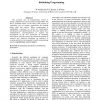Free Online Productivity Tools
i2Speak
i2Symbol
i2OCR
iTex2Img
iWeb2Print
iWeb2Shot
i2Type
iPdf2Split
iPdf2Merge
i2Bopomofo
i2Arabic
i2Style
i2Image
i2PDF
iLatex2Rtf
Sci2ools
100
click to vote
ITNG
2006
IEEE
2006
IEEE
Rethinking Programming
The accepted view of programming, rooted in Turing’s fundamental characterization of algorithms, has had a profound impact on the theory and practice of computing with yet broader implications for thinking about mind and culture. Where programming is traditionally conceived in terms of requirements, specification and implementation, this paper argues for a complementary conceptualization to support the development of the next generation of computing applications. It briefly reviews an extended programme of research into Empirical Modellng, an approach to creating interactive environments to enable programming based on identification and prescription.
Related Content
| Added | 12 Jun 2010 |
| Updated | 12 Jun 2010 |
| Type | Conference |
| Year | 2006 |
| Where | ITNG |
| Authors | W. M. Beynon, R. C. Boyatt, S. B. Russ |
Comments (0)

